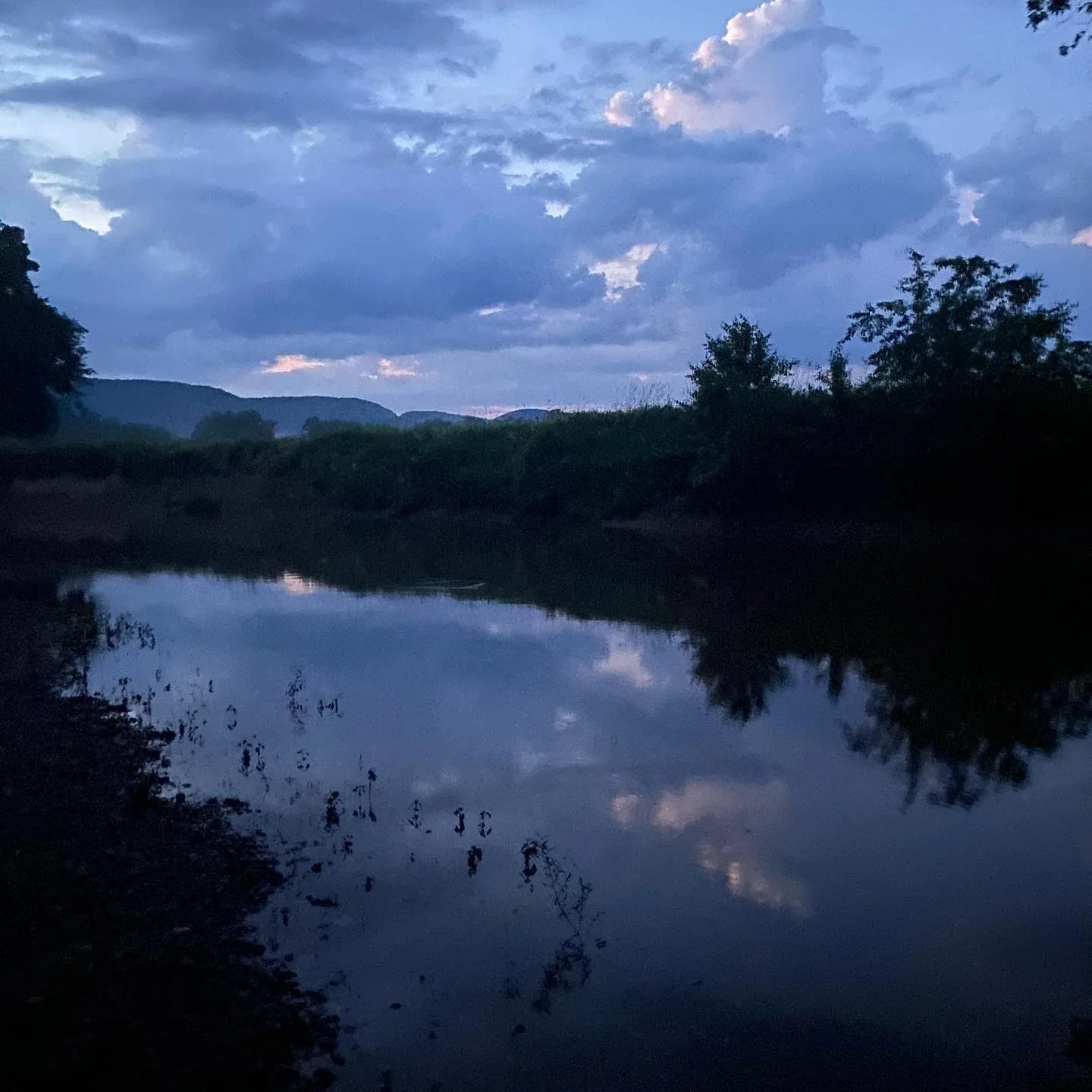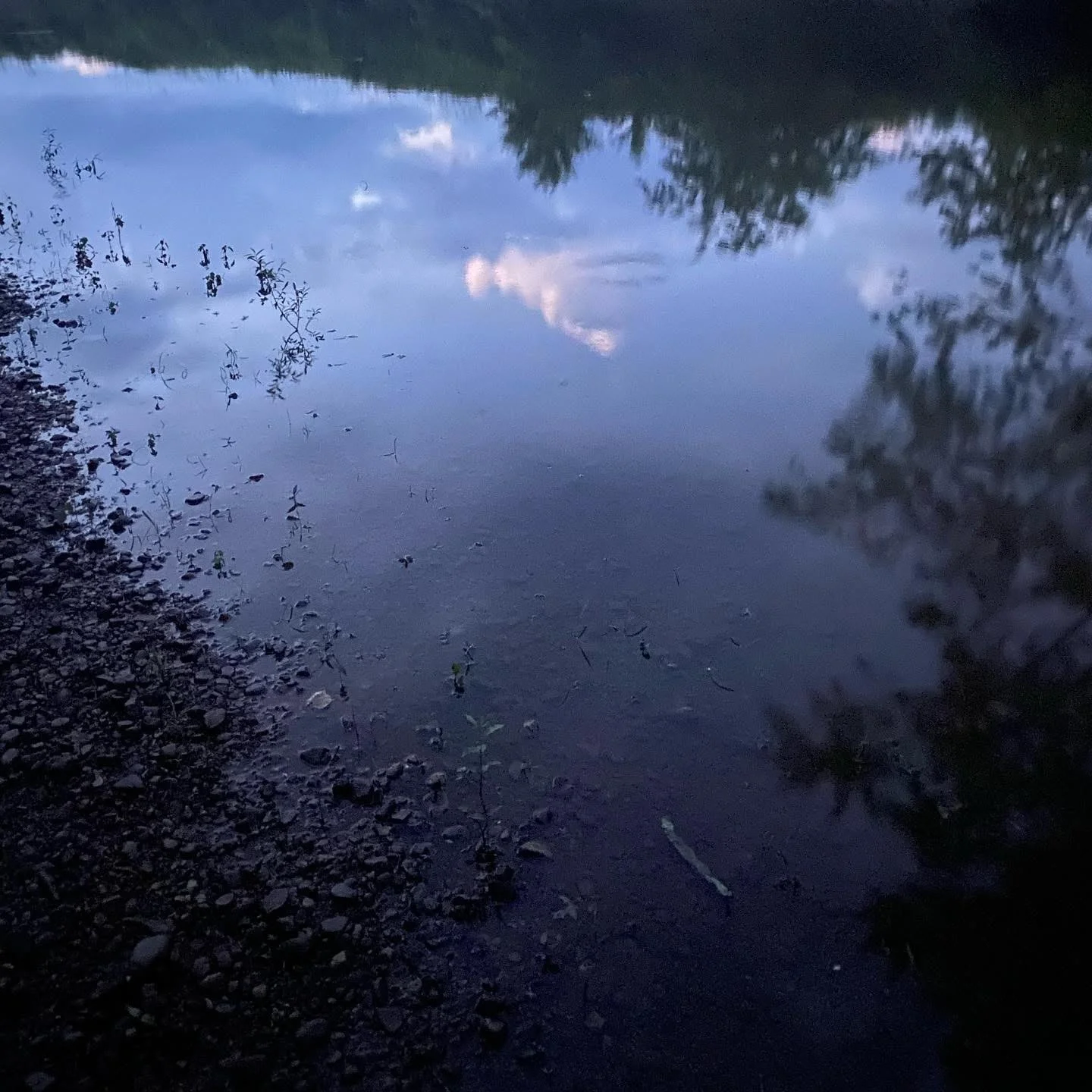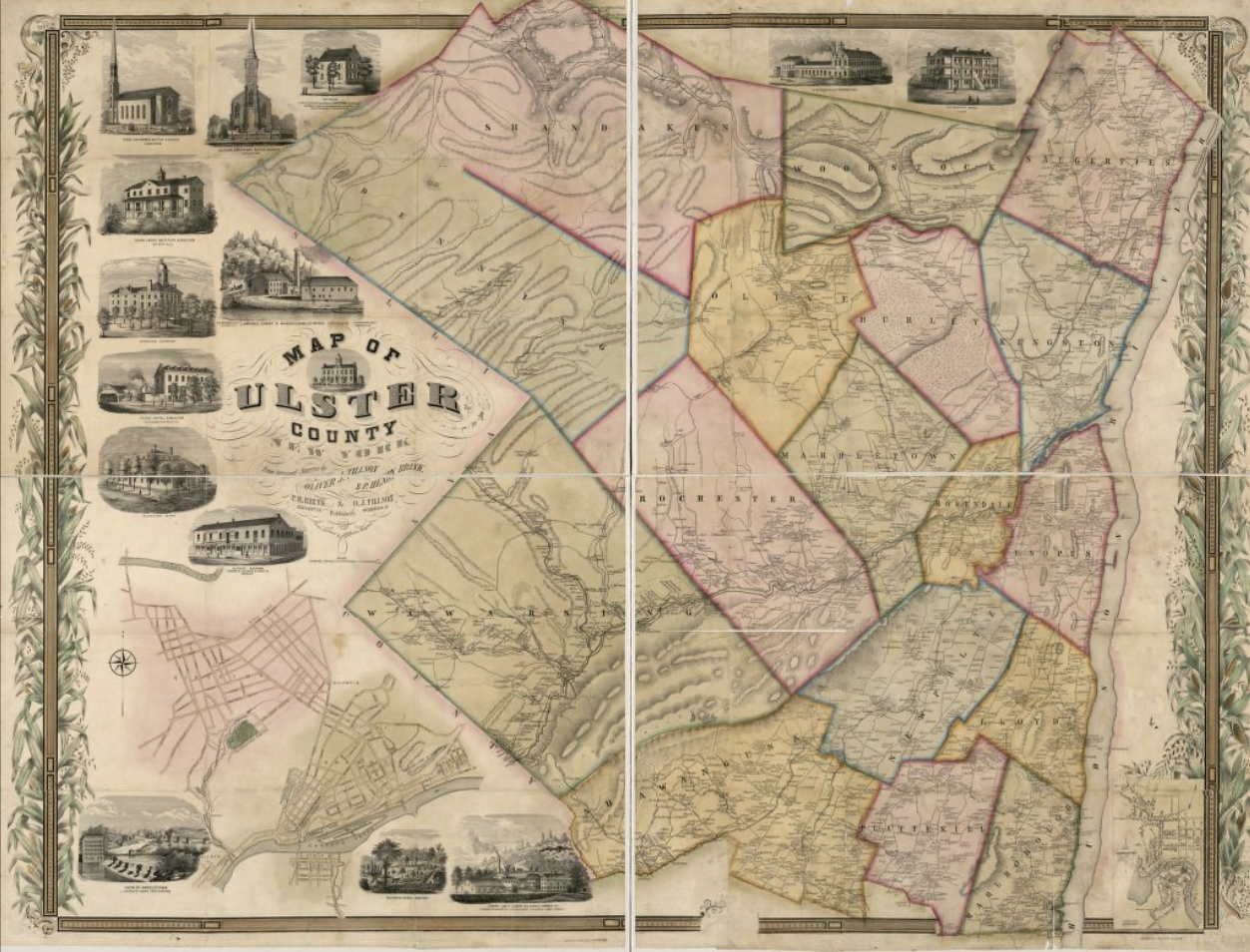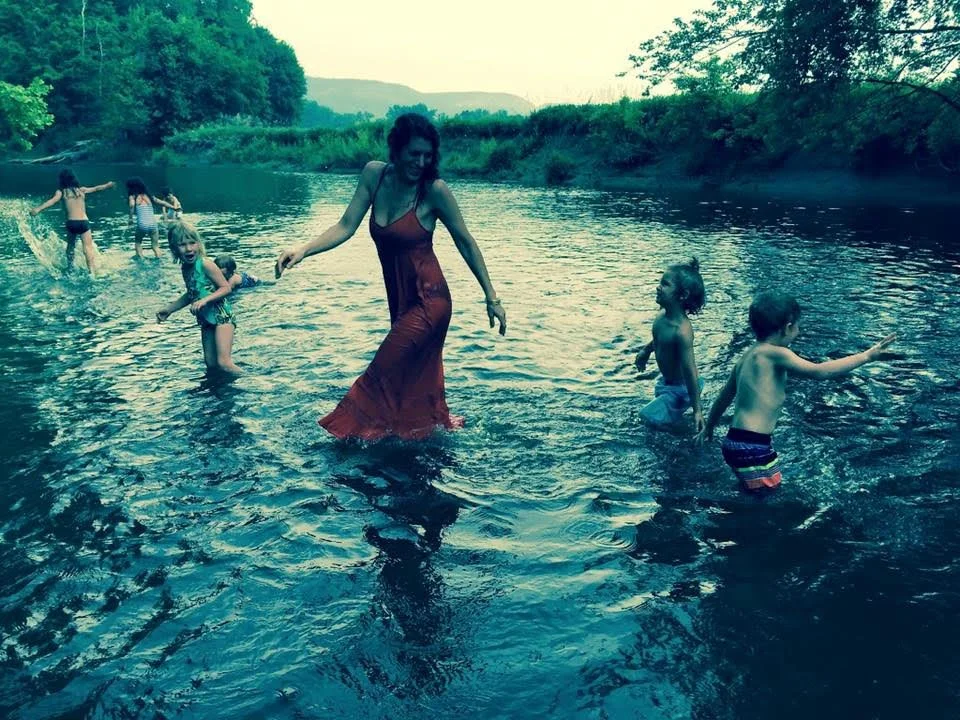My Friend River, Our Mother The Earth…
I am standing at the edge of morning. A slender line of indigo runs parallel with the snaking Shawangunk Kill River here, illuminating the trees in the place where Water meets Land. A lot of us don’t notice her nestled among us, formed of both Earth and Sky, the ways she reflects the rising light, shimmering. But silly humans don’t notice so many things, even after it’s too late. It’s my friend River I would like to tell you about now, though, for she is extraordinary. To begin with, she is inconspicuous and so humble, not wanting to draw attention to herself. In fact, I like those qualities most about her, and I have much to learn from her ways.
Photo by Jenny Wonderling
Then there is her undeniable beauty. Perhaps you haven’t been well acquainted with her graceful curves like I have, the way her skin glimmers as if possessing an inner light. And she’s incredibly generous, a refuge for freshwater Mussels, and 31 species of Fish, as well as rare Plants with unfamiliar names like the sharp-winged monkeyflower, beakgrass, threadfoot, wingstem, violet bushclover, and redrooted flatsedge. Infinite Birds and Mammals stop to admire River and are quenched by her daily in infinite ways, along with Fish, Turtles and more who live within her. She has also always welcomed humans, undeserving as we are, to float upon her surface, or cool ourselves within her exquisite body. Even after all we’ve done to her. Indeed, as compassionately as she offers herself to all the others, she has also gifted us solace and lush inspiration, even if not appropriately honored by our kind.
Again, I have much to learn from this wise one who prefers to flow with hope into what is possible, rather than wallowing in what she cannot change. Sparkling and gurgling a most jubilant symphony, she celebrates that life is always moving, her waters and banks no more constant and fixed than anything else.
“You have forgotten to ask permission to approach me,” she tells me. “One must be a thoughtful lover, to make offerings, and not just take what one needs or to take without sharing love.” Then, she rushes off again to meet the Wallkill into which she pours herself, weaving together with that larger and sadly more polluted sibling with its 69 tributaries and which meanders from end to end for more than 80 miles. Eventually, soon, they will meet their eldest sibling, the Hudson, who was once known not by the name of an English explorer, but by her more fitting eponym Mahicantuck, meaning "the River that flows both ways,” and where salty water meets fresh water running off the land as it embraces their mother, the Sea. I stand in my imitation rubber boots on the rocky shore, once again mesmerized, and then go to collect a handful of cedar from the nearby grove in the adjacent field to lay at the hem of her liquid skirt where stones touch and become immersed in water.
Photo by Jenny Wonderling
“You need permission to approach me; to make offerings,” I repeat in my head, trying hard to remember as I gingerly lay down my fragrant bouquet of green. I regret I have not done so enough, nor too many others like me, who also never learned because we thought everything was an offering to us.
River seems to take pity on my ignorance again, as she does often, and tosses this back for me to consider too, “Twischsawkin was the original epithet of my sister who is now named Wallkill. As if she doesn’t dance with swirling poetry! She has told me you should know her original name, the one that better reflects her true nature and that lies beneath the one imposed on her by those harder people, the Dutch. With their abrupt and harsh phonemes, they named things after men rather than celebrating the Spirit of each unique living element and being.”
I tried to repeat her sister’s name slowly and dutifully, committing it to inner memory. Twisch-saw-kin. Twisch-saw-kin. Twisch-saw-kin, a word that even my own body could recognize indeed sounded like flowing water, swaying hips, and currents that sing.
***
Have I told you how much I love her? How grateful I am for the ways River makes me pay better attention? Each day that she borders the property where I am graced to live, she has so many important things to teach me. Before I blabber on any more about my friend’s nourishing graces and wisdom, though, she has just reminded me that I must begin first with the ones who have less of a voice than she does. As usual, she is right. She admonishes me because I have failed to tell you enough about the quiet Mussels that once dwelled in abundance within her. She wants you to know she misses them very much.
“Forgive me,” I say, embarrassed. “It’s true that I am often so distracted by beauty, that I fail to look long enough at grief or shame, or receive their medicine. I would like to know,” I offer, “even if I also want to look away.”
“No need for apologies, pale one,” she says, as she has said kindly many times, “Especially if you don’t do anything to change things. For now, let’s just return to the Mussels, for theirs is the story of all those without a human voice and it is too often the shy and gentle ones who are overlooked.”
I have taken off my boots to feel the cool Earth. I stand awkwardly on her shore, frigid Water seeping up through the small Stones and Sand around my toes, and I do my best to pay attention.
“All Rivers know that the story of the Mussels is a tragic one of great violence.” She says this with the patience of someone who has tried to explain the same obvious thing repeatedly to another who, remarkably, still doesn’t understand. “Where there were once more than 3 hundred species of those lovely creatures living in great numbers, thriving in my shadowy places, now only 6 species remain here, and all are in danger of extinction” she says sadly, with a silent fury I rarely see bubbling up. “I am but a small River. Still, all of us have this same tale to tell, as do my Sisters, and our Mothers, the Oceans. Our Earth Mother also shares about devastation in her Jungles and Forests, and everywhere in between. There isn’t much time, though, so I will only tell you now about the freshwater Mussels.
“You may have forgotten how, not so long ago, your kind fed from these dainty treasures that lived bountifully among us, as so many creatures did. Now, to sight a Mussel in a river seems like a rare surprise, an anomaly, and to eat one, at least to most, unthinkable. Poor things, vulnerable as they are. Fresh water Mussels are too often no longer the pure beings they once were due to your chemicals and ways. And if they cannot be savored by you, you might consider they are also of harm to others…as if that is no bother.
“Did you know I was once a great source of sustenance for a people called the Lenape who lived originally and more gently in this valley? They enjoyed our friendly Mussels, and so many more Fishes that swam in abundance within me, just as so many other co-inhabitants of this land once did and are no longer: Elk, Wolves, Cougars, so many others…gone,” she trailed off.
I waited, watched, ashamed.
Early map of Ulster County and the Hudson Valley
“It was the Lenape who named my Sister and Mother originally, and also gave me part of my name, before the ending “Kill” was thrown on like a slap. Scha-wan-gunk meant “that which is smoky air.” The name is fitting because the mountains of this Valley are sometimes cloaked in a finery of clouds that have fallen to earth, but it also speaks of the gray plumes that rose beneath the cliffs after the slaughter of those same lithe hunter-farmers, when they were killed en masse and smoke rose from their burning villages, or were forcibly relocated elsewhere. Their word, Scha-wan-gunk, was wedded uncomfortably to the Middle Dutch word “Kill”, whose word meant Water channel or arm of the sea,[1] but reminds the rest of us that it is the Dutch who came and brought violence, who upended balance. Scha-wan-gunk Kill is a reminder of those people who lived here previously in gratitude and communion with my Mother, holding the resonance of their ways, and spilt blood.
“So my name is a mongrel of indigenous wisdom and the white man’s taking ways, still flowing with the poetry of the land and those closest to it, and a victim of shortsightedness and greed. I embody the aftermath of those who forgot they were not one alone, each “man for himself,” but a multifarious mosaic of creatures and beings of all kinds, all forming one complex entity of Life. My name, like the Earth, as well as women’s bodies, holds the aftermath of those who believe they are not One but many, each one of those the most important.”
Twisch-saw-kin,
a word that even my own body could recognize sounded like water, swaying hips and currents that sing.
***
As is fitting for such a being, she has a complex name. The one I am lucky enough to call her though is more intimate and informal. River. It's a sweet and lyrical name, made of sounds that are as strong and clear as she is, and which make me swoon each time I release them from my tongue, swirling their perfect syllables within the hidden places of my heart. I have to admit, I am humbled because not long ago, she gave me permission to call her River. As if I’d finally won some of her trust and, because she knows I love her “as much as a parched garden loves the rain.”
Today she still has much to say about Mussels though, and since she has not finished that lesson, she wants us to move on from names to the heart of things. And so we do: “Quiet, thoughtful, shy, the Mussels have always kept us clean by filtering Water,” she says to me, “Stabilizing the Sediment beneath where we flow. Then, just between (what you call) the years “1904” and “1916” alone, more than 73 million buttons for clothing were produced from freshwater Mussels harvested from the rivers of “your” country. 73 million. Perhaps you can know better than me what that number means?” River pauses as she tells me this, grief washing through her with her currents. “Harvested by the millions and turned into buttons?” she repeats incredulously. “Miraculous that any survived, that anything survives because of what humans have done in such a short time. My sweet Mussels are almost gone now, and silly buttons are now mostly made of plastic, which will merely rest for eons in the belly of my Mother, or in the bellies of the creatures of my relatives in the Seas.” She is sobbing now. “Perhaps now you will begin to remember what you have done…”
Between “1904” & “1916” alone, more than 73 million buttons were produced from freshwater Mussels in the US. (Top & bottom right images from molluskconservation.org)
She has stopped sharing, and so I wait, and watch.
Finally a long, deep howl rises from somewhere beneath her, a scream of grief unlike anything I have ever heard, summoned from the furthest depths below her. She is heaving, losing what seems like breath. I stand on the bank rocking, holding my ears, my own tears falling while knowing we must embrace grief to heal, that it is necessary to recognize loss in order to dream a new way.
Eventually, I hear her whisper, as if her voice is worn out, “Taking and taking and not giving? Taking and taking and taking without thanks?!” she screams, then falls silent again.
After a while, she offers this: “Yes, once not so long ago, I ran even more clear and full, I was teeming with uncountable creatures of all kinds; an integral part of the “food chain” as you call it,” she said, scoffing at our ignorance, yours and mine.
“What do you call it?” I ask naively.
“Decency. Balance,” she answers flatly, knowing every being still deserves to enjoy her important offerings, and to thrive. She is also reminding me, like any great matriarch should, that she too deserves to be honored for her generosity, the great source of sustenance she once was and still tries to be, in spite of the challenges. “So many more used to sup at my table,” she says sadly. “And like my Mother, I have always offered a seat to every being that craves to be nourished—as long as they are respectful, and clean up after themselves. That is the difference between “your” kind and mine.”
Then she went quiet again, pulling herself in. While I waited for her to gather her thoughts, I stood amazed at how to some, the Shawangunk Kill River may seem delicate and unremarkable, moving languidly most days. She may not be as known as those nearby, of which she is also a part, but she is mighty in wisdom, if you are willing to listen. This smaller sister of the sassy Wallkill undulates gently, flowing south to north into her, two bodies as one, taking each others’ hands again to pour eventually into the formidable Hudson.
My beautiful, flowing friend River, is an adaptive shape shifter. She is water, ice, vapor, rising, falling, patient and demure as a stream, rushing, rising again mightily to flood the nearby fields between her and my family’s home into a lush and dark lake, and then receding, remarkably, before a day’s end. She possesses the patience of a soft armed grandma, moving hunched and so slow that she may seem still, like she has all the time in the world. Within her, among her, of her, though, is a pulse and charge of great power. While she moves gently…she does until she chooses not to. And when we need to be reminded of what she possesses, she can rise up, swelling to mythical proportions, dry fields transformed to dark lakes, that quiet stream a torrent. It’s a good thing to know.
Photo: Jenny Wonderling
She finally says to me, “It’s about “time” one of you listened…although the rest of “us” don’t measure and divide life with such a silly, arbitrary notion as “you” and me, minutes, and us and she. But I will try and meet you where you are, human. Please try and pay attention. Soon, that clock you are so obsessed with will not be able to be turned back: all the Waters and my Mother’s exquisite dark Earth will be too sullied and leached of its goodness to sustain you. Forgive me for saying, but for all your collective intelligence, humans are quite primitive and stupid. There are stronger words I’d like to use, but they may get in the way. Still, you need to know, I am very disappointed in you furless two leggeds, and I am not the only one. I know you are too. Somewhere beneath all that exuberant consumption, even you know that something is not right. And of course there is- for again, there is no “you” or “me” because there is only an “us”: one body, cells of the same organism, a being of complete and constant union.
“On behalf of our union, though, I need to tell you, Those Of You Who Seem To Have Forgotten You Are Not Alone, you will no longer have the right to decide for the rest of us soon, or for the unborn generations whose right it will also be to enjoy our Mother’s divine and rare offerings. To begin with, the things you have sprayed on “your” crops once too many times, poured into our veins, bitter ugly things that kill beauty,” she takes a deep inhale, swelling her belly. She tells me. “Too many humans. Too little planting or giving or even savoring. Too much taking.”
Top left: “clammers” on mussel shells, photo: molluskconservation.com; top right: buffalo skulls; bottom right: 40,000 buffalo hides, images: historycollection.com bottom left: elephant tusks, last photo: images: Reuters.
Quiet once again, she spares her words for me. Eventually she erupts the same sounds I once witnessed in that liminal moment between last year’s winter and the start of spring, when the solid Ice that was her body broke apart. A being ruptured by rising temperatures, the eerie sound of a thing releasing itself from itself. That day long ago, a rumbling and belching could be heard, as if a fire burned within, shaking apart the surface into jagged islands, heaving shards of winter. This iceless morning, I know these are sounds of anguish, of honoring pain so that we may move forward together in a good and honest way.
“WAKE UP!” She screams this so forcefully that I, at least, may listen better, and not waste any more time.
If you only knew what a forgiving teacher my River is, reminding us as best she can that we seem to have forgotten why we’ve come. She knows her power, even if we have too often ignored her, all the while loving us in spite of ourselves. She tells me that we have also forgotten this: that even rage is sometimes called for; that eventually she will have to empty herself to let new things grow and flourish in a new way. Unless we can honor Our Mother The Earth once again.
Of course my ancient friend doesn't want to have to get our attention so harshly. But sometimes it is not until things are taken away that we can remember that nothing is constant, nor should be taken for granted. She says, “But like me, too many “things” are these days: each tree and breath and bee. The unseen and winged ones, waters in all our forms. Even love. Each sunrise. And you…Oh, especially You,” she says, her bounty shimmering in the rising glow of morning. “To forget bees, and LOVE!” She laughs, her currents spinning at the joke of it all. “Can you imagine?!”
After a while, she says, “It’s time every one of us remembers that we are all of one body, one flowing form. It’s time to honor me, to honor YOU and US,” she reminds me with tenderness. “Your kind has polluted us enough, as if we are not each important, not Divine.”
The sun has come up bright and strong over the valley.
“Wake up! It’s time to take no more than you need, to appreciate what you have, and to celebrate what you came here for. It’s time to be joyous—to come together and create positive change! It’s time to remember the Mussels, and all of the beauty of our World.” And just like that, (whoosh!) she has shaken off the last of the night’s wintry hand, her own chilled surface surrendering again to warmer inner places and the rising sun which is now strong above us. I watch the ripples of swirling currents upon her surface. She is flowing her watery body north to meet her Sister, moving forward in her unique way, ever-embracing change. Meanwhile secretly in her dark, things are also stirring, readying for the excitement of spring…
-end-
PS. If you would like to contribute to (or get involved with!) a great local organization working hard to counter balance some of the madness through advocacy, river cleanups and more, please check out riverkeeper.org.
Water.org has also empowered more than 43 million people with access to safe water or sanitation through affordable financing. Just $5 empowers someone in need with lasting access to safe water!
There’s so much goodness happening- right now! YOU can help in your own unique way!
PSS. INVITATIONAL EXERCISE:
Please find a comfortable, quiet spot to go within without interruption, honor stillness and reconnect with nature. This might be done in the Woods or near a body of Water, or—since we all carry Nature within—can be accessed from anywhere. Find a seated position that feels comfortable. Could be in a chair or on the floor with your back against a wall, or cross legged on the floor. The important thing is that you are not straining and that you can be still and grounded. Really feel the floor and how your body feels- in your clothes, against any surfaces, in space. Now when you feel a bit more present…
First, focus just on your breathe, bringing a calm and easy, yet deep inhale to all your parts, bathing yourself with inner light. Then exhale love. Repeat 3 times. Notice where you are holding any tension in your body, where you might be resisting. Notice the temperature of the air, the feelings and sounds you are aware of, then let them pass. If you enjoy this exploration of breath, continue for at least 5 minutes in this peaceful way and for as long as you like…
When you feel complete in the first stage of the meditation, start floating backwards through the interior movie of your life. Please pause at any places and times when you communed fully with nature, and specifically a body of Water. See how you feel there in each of your memories. Really notice, let the feelings and emotions wash through you, and send love and thanks to each place, each river, ocean, pond, etc.
When you feel you have come upon some strong visceral memories, please take at least 20 minutes (hopefully much more) to write, draw, collage and/or Mind Map about any of those experiences.
When you are done:
Please consider how many of those places are now polluted, and how present and future generations may not be as lucky as you to enjoy them without any danger or that the balance of creatures since then may not be the same. But don’t despair- there’s so much that can be done in creative and important ways! Whether you give to an organization that is working to help, can take time to write your representatives or companies like Monsanto, or can channel your emotions through creativity and communication with others- do so!
Also, I would love to know how this writing and these exercises affected you so please reach out!: jennyawonderling@gmail.com
Together, much can be done to make change and be part of the solution! Not to mention make a joyous community and world! ❤️
“Wake up! It’s time to take no more than you need, to appreciate what you have, and to celebrate what you came here for. It’s time to be joyous! It’s time to come together and create positive change.” Photo by Sarah Perotta








